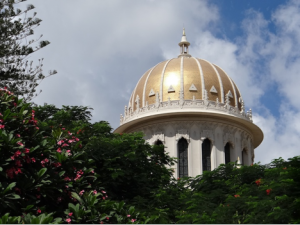Source: http://iranwire.com/blogs/6264/2781/
Translation by Iran Press Watch
By Jahan Shahjavid

For a secular person like me, it may seem strange to see the delightful Baha’i gardens in Haifa, Israel. However, this was indeed the case.
When I decided to go to Israel, the very first thing I did was that I contacted Baha’i friends and acquaintances and asked them about the possibility of going to see the gardens.
Arrangements were made, and with the assistance and accompaniment of Sara Vadir, Vahid ‘Alaviyan, and Tarane Raf’ati, three representatives of the Baha’i community, I saw the gardens of Haifa and ‘Akka, including the shrines of the Bab, Baha’u’llah, and ‘Abdu’l-Baha, all in one day. I also learned about the brief history and activities of the faith in the region.
It was a good day. The gardens were beautiful—flawless, one of the most exquisite in the world. And my companions were very loving and warm-hearted. My mind, however, was busy thinking about one thing: it’s so bizarre that Baha’is are persecuted and oppressed in our country.
My interest is in a person’s personal conduct and professionalism, not their religious belief. Let us refer back to people’s conduct prior to the revolution, when I was in school in Abadan [the oil production capital of Iran]. Two of my classmates were my friends, and one of them was a Baha’i. During that period, religious people, at least in their family life, in the oil industry, would never raise any protests or concerns. However, after the revolution, when I entered journalism, as an observer, the feelings and sentiments of Muslims and their non-religious acolytes about this “sect” (Baha’is) became clear to me.
What’s unbelievable and interesting to me is that a prophet (Baha’u’llah) appeared in Iran with a message of peace, love, and the equality of all humankind, but in the land of its birth it has been condemned and attacked in the worst possible way. I understood religions had their differences with each other and each perceived itself to be better than the rest, but they usually tolerate one another and don’t interact. How come this wasn’t the case in Iran? Why are Baha’is not tolerated? How come their basic human rights aren’t upheld and respected?
We more or less know why the fanatical Shi’ite clergy and the leaders of the Islamic Republic treat anyone who thinks differently, especially if it is in a way which threatens their monopoly on power and undermines their rule.
It is a basic fact that Muslims accept Muhammad as the “Seal of the Prophets”, and the Shi’ites are awaiting the appearance of the promised Mahdi [the “Rightly Guided One” of the end of days], so the appearance of a new religion in the heart of the Islamic world with controversial claims becomes problematic. However, the age of bloody religious wars has passed. Today, we live in a world where religious freedom is recognized as one of the basic, fundamental rights of people. We and several other countries have lagged far behind in this regard.
Iran is one of the few countries in which some of its people are not considered citizens. The Baha’i Faith is not recognized in the constitution of the Islamic Republic as an official religion, so its followers have been deprived of basic rights. From 1979 up until now, hundreds of people, leaders and members of the Baha’i Faith, have been imprisoned or executed. Most of their property and belongings have been confiscated without justification. Their children have been harassed in public schools and have no right to study in Iranian colleges and universities. Their homes and businesses are regularly attacked and they are pressured by fanatic Muslims to convert to Islam. They are prohibited from having places of worship and religious ceremonies. Even their cemeteries are destroyed. What is this? Should we not feel ashamed that our country acts in this manner just because some people have different beliefs?
The situation is completely different in other parts of the world. It is said that the Baha’i Faith is the fastest-growing religion compared to others. This Iranian religion encompasses the entire world. Now is the time for us, like other ancient religions of the past, to take them into account and recognize them. This is the least of our duties as human beings.
July 12, 2014 1:46 pm
Thank you for taking the time to research and share your account. God bless. This is a worthy goal at this time in existence on Earth. Religious tolerance is a basic human right for all people in all climes. Baha’u’llah says that “World peace is not only possible, but inevitable.”
July 31, 2014 6:09 am
One important source of opposition against Baha’is is that teachings jeopardise the authority of the clerics. The unicity of God and of His prophets, the personal and indepenant search for truth, the conformity if religion with science and reason, the abandoning of prejudice and superstition, the equality of man and woman, the abolition of priesthood, and many other such teachings are diametrically opposed to the concepts and practices promoted by the clergy in Iran who derive power and earn a livelihood through religion. It follows that spreading the Baha’i teachings becomes a threat to the security of a state founded on archaic concepts and the authority and the power wielded by the clergy.